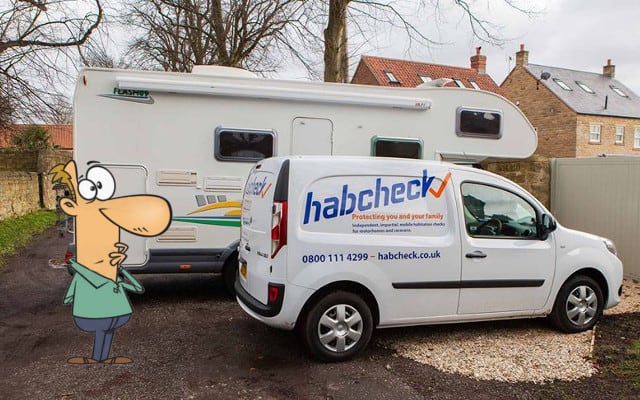
A motorhome is a significant investment. Therefore, you obviously want it to maintain as much of its value as possible while being a safe and comfortable environment for you to use. When it comes to servicing motorhomes, they are treated as two separate parts. The industry generally refers to the motorhome engine bay and chassis as the ‘front end’ and the actual main body and living space of the motorhome as the ‘back end’. In this particular post, I’m going to discuss the checks which need to take place as part of a habitation service on the ‘back end’ of the motorhome. Can you (or should you) perform your own DIY habitation service, or should you just leave the habitation checks to the professionals?

To quickly get to the point, I believe there is a certain part of a habitation check you should always leave to the professionals, and that’s testing the gas system.
The risks associated with carbon monoxide poisoning are just too high to take lightly.
A professional gas engineer has access to tools to properly test a motorhome’s gas system, which your average DIYer doesn’t.
However, when it comes to the rest of the checks as part of a motorhome habitation service, DIY or using a professional is debatable.
Disclaimer: Hey! By the way… any links on this page that lead to products on Amazon or Caravan Guard are affiliate links, and I earn a commission if you make a purchase, with no additional cost to you 🙂
- Dissolves waste and removes odours naturally and has delightful mild fragrance
Want To Visit Horton Common? – Book Here
Table of Contents
Introduction To Motorhome Habitation Checks
Before I start discussing the pros and cons of DIY versus professional habitation checks, I should really establish the range of typical checks involved.
Therefore, the first video I’m going to reference in this post is from Practical Caravan and ‘Diamond Dave’ on how he carries out motorhome habitation checks for his customers.
Now, the above video is just under 7 minutes long, and a full ‘proper’ motorhome habitation service can reportedly take around 3 hours and include over 50 checks.
However, Dave has referenced some of the most important habitation checks, which I’ll quickly summarise:
- Motorhome Bodywork Inspection: Checking for cracked panels and damaged seals which may potentially lead to water ingress/leaks.
- Internal Damp Check: Using a moisture meter to see if water ingress is a potential issue which may require further inspection.
- Electrical Checks: Checking that both the 12V and 230V electrical systems are operating correctly and safely with a good earth. Along with checking the condition of the leisure battery.
- Gas System Checks: Checking for gas leaks and if the gas regulator can maintain pressure and sufficient flow. This should include removing the fridge vents to service the gas burner on three-way fridges.
Motorhome Warranties & Professional Habituation Checks
Ok, so really, the first question you need to ask yourself when it comes to DIY versus professional habitation checks (beyond the gas system) do you need to maintain your motorhome’s warranty?
Many motorhome manufacturers will provide a warranty against water ingress/damp, however, its conditional.
The condition will be that the motorhome is tested annually for dampness by a suitably qualified engineer (more on them below).
You will need written evidence/a certificate to prove the annual tests have taken place.
Due to the significant investment that a motorhome is and the significant cost/damage water ingress can cause during the warranty period, you need professional habitation checks.
Motorhome Residual Values & Professional Habitation Checks
The second question beyond the motorhome warranty period you need to ask yourself when it comes to DIY or professional habitation checks, do you want to maintain the highest residual value for the motorhome?
The residual value just simply means the potential future value of the motorhome at a point of sale.
I’m sure when/if you were purchasing a used motorhome, you would attribute more value to a vehicle with evidence of annual professional habitation checks.
When it comes to how much value that evidence of professional habitation checks adds to the value of the vehicle, its dependant on lots of different factors.
For instance, the perceived quality of the motorhome itself. Used Hymer motorhomes appear to retain strong residual values even without evidence of annual habitation checks.
Service Centre Or Mobile Engineer Habitation Checks?
Whether you are just looking to have your gas systems/electrics checked over by a professional or you’re looking for a full habitation check, you have two options.
You can either drive your motorhome to the service centre or have a mobile engineer visit.
Now, depending on whether you store your motorhome at home or at a storage yard, that will dictate if a mobile engineer visit is possible or practical.
Typically, the requirements for a mobile engineer to conduct their work will be a free space of 1m all the way around the motorhome.
The mobile engineer may also require access to a 230V supply and potentially mains water.
Another video I wanted to reference with regard to motorhome habitation checks is from Caravan Guard.
In the video below, they interview a representative from HabCheck, who offers quite a popular habitation check service with their UK-wide network of mobile engineers.
At the time of writing this post, HabCheck’s TrustPilot rating its very respectable. You can find other industry-approved mobile engineers through the Approved Workshop scheme.
As discussed in the video above, a habitation check generally starts from £200.
The actual cost will depend on the extent of the habitation checks beyond the core checks on the bodywork, damp checks, electrical systems and, obviously the gas system.
Its worth noting that systems such as solar panels will not typically be checked out as part of a standard habitation service.
Furthermore, the engineer may or may not service facilities such as your fridge or air conditioner if you have one. If you have Alde wet central heating, make sure they will check/fill the glycol.
An important point raised in the video above is being wary of very cheap habitation inspection quotations.
If a full ‘proper’ habitation service is supposed to cover over 50 checks, take 3 hours, and you are being quoted significantly less than £200, you do have to wonder how thorough they will be.
You’re obviously not just paying for the certificate, you want all the services/facilities which are supposed to be checked in safe working order.
DIY Motorhome Habitation Service Checks
Ok, if we presume a scenario where your motorhome is out of warranty, and you are reasonably capable of general DIY tasks, you may consider conducting your own motorhome habitation checks.
We have several guests visit Horton Common who I know choose to do their own DIY motorhome habitation checks.
However, as stated above they, as you should too, leave the checking of the gas system to the professionals.
Check Motorhome Bodywork While Cleaning
The perfect time to check over your motorhome’s bodywork and seals is when you clean your motorhome.
While a mobile service engineer will only be able to spot potential areas of water ingress on an annual basis, the more you wash your motorhome, the sooner you can spot potential issues.
Fixing any potential leak paths in the motorhome’s bodywork as soon as possible saves you a significant amount of money before it turns into a full-on damp problem.
If you do spot window scratches, you may be able to repair those yourself.
Purchase Your Own Damp/Moisture Meter
With your own damp/moisture meter, you can check the interior surfaces of the motorhome frequently for damp. If you do believe there is a potential issue, you could then call a mobile service engineer.
With their higher quality/more accurate moisture meter, they can either confirm if there is or isn’t a potential damp issue developing.
The quicker you find and address a damp problem, the cheaper it will be to fix.

While consumer-grade moisture/damp meters are not as accurate as professional devices, they can serve as early warning indicators of a potential damp issue: Image – Amazon.co.uk
Check The Battery On Your Carbon Monoxide Alarm
While I believe you should always leave checking over the gas system itself to the professionals, you should personally be checking your carbon monoxide alarm.
As discussed in my post on motorhome accessories, this really is the most important accessory you could own, as it may just save your life.
Now, its obviously not going to be able to do that if the alarm isn’t functioning properly. Furthermore, don’t just check the carbon monoxide alarm as part of an annual servicing routine.
Literally, check its operating correctly before each trip out in your motorhome. Make it a habit to press that test button.

Most carbon monoxide alarms use AA batteries. Make sure to have spare batteries in your motorhome should the CO alarm fail to sound on a test: Image – Amazon.co.uk
Conclusions On Motorhome Habitation Checks
Besides the gas system, which should always be checked over by a competent professional some motorhome owners do choose to go down the DIY route as opposed to purely having a full professional habitation service.
Before you choose the DIY route, you have to consider and honestly evaluate your own DIY skills.
If you personally have any doubts about your proficiencies to carry out the required checks, that means you should probably just leave the whole process to the professionals.
However, if you are confident in your abilities, your motorhome is out of warranty, and residual values don’t concern you, then you may choose to opt for the DIY route.
Ultimately, you are the one responsible for the safe operation and use of the motorhome. This also means making sure the vehicle has a legal MOT with the motorhome’s tyres and brakes in good condition.
Thanks for reading, and I hope in the near future you consider coming to visit us here at Horton Common to experience our fully serviced pitches and amazing views over the Staffordshire Moorlands and Peak District National Park. 🙂
Want To Visit Horton Common? – Book Here


